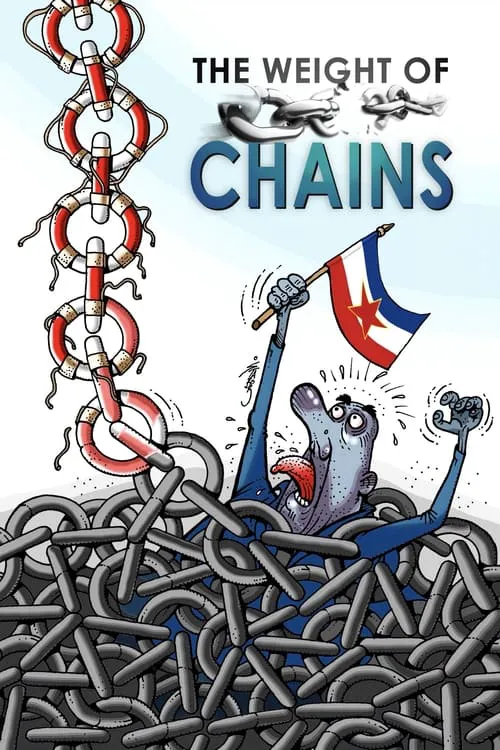The Weight of Chains

Plot
The Weight of Chains, a Canadian documentary film, embarks on a thought-provoking and visually captivating exploration of the events that led to the tragic dissolution of Yugoslavia, a country that was once hailed as a model of peaceful coexistence amidst a tumultuous post-war Europe. The documentary begins by examining the complex and multifaceted history of Yugoslavia, a nation that was forged in the aftermath of World War II. Born out of the ashes of former warring states, Yugoslavia was created as a federal republic, comprising six republics: Bosnia and Herzegovina, Croatia, Macedonia, Montenegro, Serbia, and Slovenia. Led by Josip Broz Tito, the country embarked on a path of socialist reform, establishing a unique blend of socialism and nationalism that seemed to defy the conventional wisdom of the Cold War era. The film's narrative seamlessly weaves together historical context with eyewitness accounts, as academics, diplomats, journalists, and ordinary citizens from the former Yugoslav republics share their firsthand experiences and perspectives on the events that unfolded. Archival footage, often previously unseen by Western audiences, provides a visceral and immersive experience, placing viewers in the midst of the conflict. The early 1990s saw the Yugoslav system of government begin to crumble, as nationalist sentiments began to boil over. Slobodan Milošević, the then-President of Serbia, implemented a series of policies aimed at strengthening the centralized power of Belgrade, which ultimately had a devastating impact on the unity of the Yugoslav federation. The international community's response to the emerging crisis was marked by a lack of decisive action, as the West hesitated in providing meaningful support to the Yugoslav government, despite the escalating violence. The film argues that the United States, NATO, and the European Union bore significant responsibility for the tragic breakdown of Yugoslavia, as their inaction and diplomatic bungling allowed the conflict to spiral out of control. One of the key protagonists in the documentary is Vesna Pusic, a Croatian politician who became a key player in her country's transition to independence. Pusic recounts her personal experiences, as she navigated the treacherous waters of Yugoslav politics, struggling to balance the rivalries and tensions between different ethnic groups. The film also highlights the pivotal role played by the international media in shaping public perception of the conflict. A prominent interview with Robert Fisk, a renowned war correspondent, sheds light on the often-unsavory biases of Western journalists, who often prioritized sensationalism over fact-based reporting. Fisk's critique serves as a stark reminder of the complex challenges faced by journalists covering conflicts in hostile or unfamiliar territories. The documentary does not dwell solely on the dark aspects of the Yugoslav conflict. On the contrary, it presents numerous inspiring stories of bravery, self-sacrifice, and, above all, hope. Ordinary citizens, who came from different ethnic backgrounds, displayed remarkable resilience and solidarity, defying the odds to help one another in the face of war. The film highlights instances of cross-ethnic cooperation, where people risked their lives to rescue others, often in complete disregard for their differing nationalities. These positive narratives form a powerful counterpoint to the dominant Western narrative, which tends to focus on the darker aspects of the conflict, often framing the war as a simplistic struggle between good and evil. The Weight of Chains, however, offers a more nuanced and multidimensional portrayal, acknowledging both the complexities and the heroisms that emerged in the face of unimaginable crisis. Throughout its compelling narrative, the documentary also examines the lessons that can be drawn from the Yugoslav conflict, and the implications for international relations in the post-Cold War era. The film cautions against simplistic dichotomies, urging viewers to engage with the messy realities of conflict diplomacy, where multiple parties, each with their own set of motivations and interests, engage in a delicate balancing act. As the film draws to a close, it invites viewers to reflect on the profound consequences of the West's intervention in the Yugoslav conflict. By engaging with multiple perspectives, historical context, and inspiring stories of courage and resilience, The Weight of Chains offers a comprehensive and thought-provoking exploration of one of the most tragic conflicts of the 20th century. This documentary leaves an indelible mark on the audience, raising important questions about the responsibility of powerful nations, the role of international media, and the capacity of individuals to defy adversity in the face of unimaginable chaos.
Reviews
Recommendations




